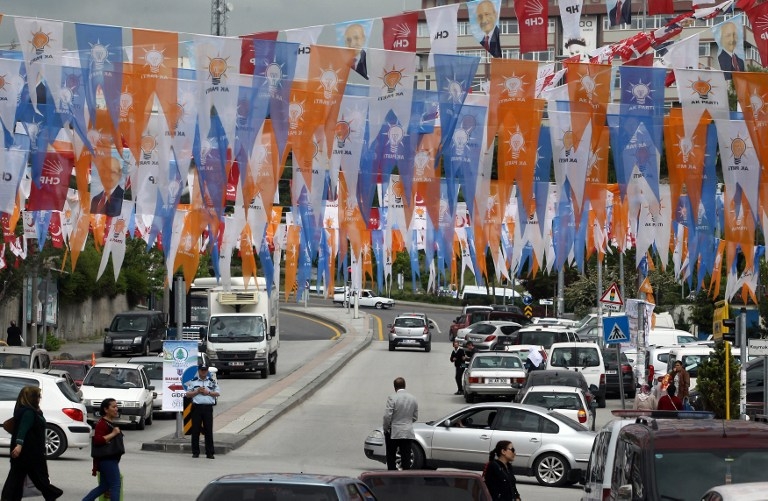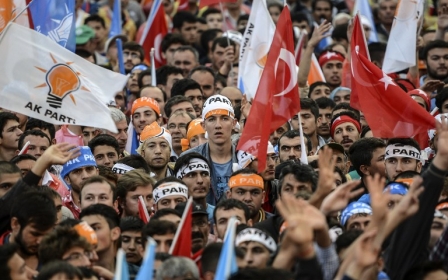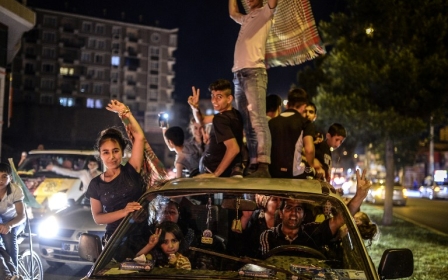Turkey's biggest political rivals in coalition talks

With Turkey's Justice and Development Party (AKP) still searching for a coalition partner after failing to secure a simple majority during Sunday’s general elections, a so-called grand coalition with the secular Republican People’s Party (CHP) could become a reality.
The AKP and CHP are reportedly testing the waters as to whether they can overcome their deep differences and form Turkey’s next government.
Through this coalition, the AKP may manage to keep the Kurdish peace process alive and stop the erosion of its support among the Kurds, but the party will also face having to agree to CHP conditions, namely an end to President Recep Tayyip Erdogan’s vision of moving the country from a parliamentary to a presidential system.
In the unofficial talks between AKP - which garnered 41 percent of the votes - and CHP - which took 25 percent, negotiators are reportedly discussing how an AKP-CHP coalition government would be the best option for the normalisation and restoration of stability in Turkey, according to the Turkish Hurriyet Daily News.
On Wednesday, a surprise meeting between CHP’s freshly-elected Deniz Baykal and Erdogan in which Baykal - as the oldest MP who resigned from CHP after a scandal in 2010 - was appointed to temporarily preside over the assembly was seen by observers as another signal of a potential CHP-AKP alliance forming.
The meeting and talks come a day ahead of a scheduled meeting in which Erdogan is to give Prime Minister Ahmet Davutoglu a mandate to form the next government.
Just days ago, an AKP-CHP would have been suprising as a possible outcome of the election results. Analysts thought AKP was more likely to either join hands with the pro-Kurdish HDP or far-right nationalist MHP, a scenario that would have put the Kurdish peace process in jeopardy.
But after the election, all opposition groups refused to enter into a coalition with AKP. Now the religiously-conservative AKP and the secular Kemalist CHP - considered bitter rivals because of their starkly different views on the future of Turkey - may agree to put their differences aside.
“While both before, and immediately after the elections, opposition parties were against forming a coalition with AKP, CHP is now considering this option as a means to enter government,” said Turkish journalist Cagri Ozdemir.
An AKP-CHP coalition would potentially focus on efforts to strengthen the economy and intensify social investments, as well as endorse the continuation of the Kurdish peace process as the two parties’ views aren't so far apart on the matter.
“Although two years ago CHP was against the peace process, it now supports the project after the party realised it needs to jump on the bandwagon,” said Ozdemir.
“But CHP will push for making the talks more transparent. Its main issue before [the elections] was that the talks were managed behind closed,” he said, referring to the talks being exclusively between AKP and the outlawed PKK, with little information disclosed to the public on specifics.
The potential for a CHP-AKP alliance has also gained traction with the pro-Kurdish HDP, Salahettin Demirtas, who publically supported discussions between CHP and AKP after the elections, leading some to believe the HDP will likely endorse such a partnership.
But while the coalition may bring stability to Turkey and help AKP pick up some its electoral losses specifically in the Kurdish southeast, HDP’s support would come with conditions.
“An AKP-CHP coalition would have the support of HDP if its mandate is to push for reforms particularly in drafting a new constitution along the lines of Kurdish demands,” said Aaron Stein, an associate fellow at the London-based think tank RUSI.
Erdogan’s presidential ambitions
The biggest hurdle of an AKP-CHP alliance will be Erdogan's ambitions to establish a presidential system in Turkey, something CHP stands firmly against.
The stance Erdogan adopts will therefore play a crucial role in negotiations between the two parties, analysts say.
“The potential problem comes from Erdogan himself and whether he is ready to give up on his presidential aspiration regardless of an electoral outcome,” said Stein.
Ozdemir agrees: “The biggest issue before agreeing to enter into a coalition will be the presidential system. If an AKP-CHP coalition is formed, Erdogan’s ambitions for a presidential system will likely go down the drain,” said Ozdemir.
Another major issue of disagreement is the corruption allegations launched against AKP in December 2013. CHP may demand that four former ministers implicated in the 2013 corruption case be sent to court.
“Such a coalition would need to reopen the corruption cases that were blocked under the previous government. In any case, with its parliamentary majority gone, the AKP cannot prevent these cases from being investigated if the other parties decide to pursue this course of action,” wrote Sinan Ulgen, a visiting scholar at the Brussels-based Carnegie Europe, on Tuesday.
But according to Stein, Erdogan would not support a coalition that would bring back the corruption allegation, giving rise to speculation that there are divisions hardening within AKP.
“AKP will think about what they did wrong. There already is unease within AKP because of Erdogan’s attitude, [which some] feel has pulled AKP down.”
“Dissident voices within AKP may opt to side-line Erdogan so that they can continue with a normalised parliamentary system,” he added.
Stein however believes while a split within AKP is unlikely, he says: "If there was ever a time that Erdogan were to be side-lined, this is it.”
Election still possible?
Erdogan’s written statement after the elections called for all political parties to move responsibly in order to ensure the government does not remain rudderless, but some analysts expect him to push for early elections.
“Erdogan could be angling for an early election since a coalition may be good for AKP, but not for Erdogan himself as there are far more pitfalls for Erdogan in that outcome,” said Stein.
At the same time, while a coalition would allow CHP to be in government, that scenario is also risky for the secular party too.
According to Erden Erdem, a politics researcher at Hacettepe University, the talks are a mere propaganda stunt as CHP entering into a coalition with AKP would lose the party a major part of its voter base.
“CHP supporters are angry with AKP and Erdogan and there support for CHP comes from its campaign against them. If CHP enters into a coalition with AKP, it would lose support,” said Erdem.
“There is literally no chance of a CHP-AKP coalition. There reason for the meeting is that CHP does not want to be seen as responsible for a crises in the country,” he added.
According to Stein, there is consensus that early elections are not healthy for the country and therefore none of the parties wants to be on the hook for what might come if the country is left without a government in place.
The results of the consultations will be reported to the leaders of the two parties in the coming days.
Middle East Eye propose une couverture et une analyse indépendantes et incomparables du Moyen-Orient, de l’Afrique du Nord et d’autres régions du monde. Pour en savoir plus sur la reprise de ce contenu et les frais qui s’appliquent, veuillez remplir ce formulaire [en anglais]. Pour en savoir plus sur MEE, cliquez ici [en anglais].




